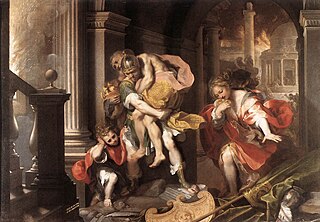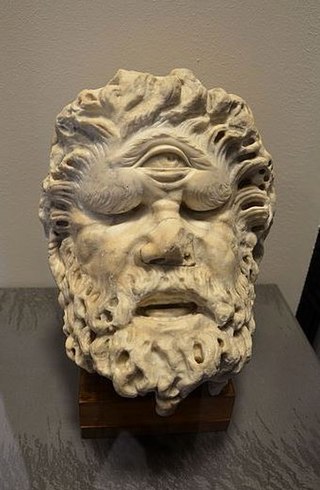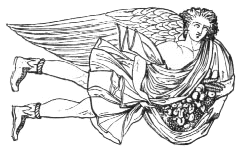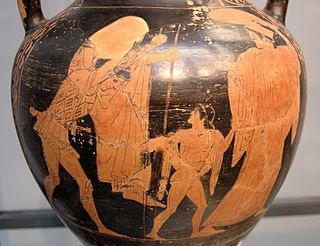Related Research Articles

The Aeneid is a Latin epic poem that tells the legendary story of Aeneas, a Trojan who fled the fall of Troy and travelled to Italy, where he became the ancestor of the Romans. Written by the Roman poet Virgil between 29 and 19 BC, the Aeneid comprises 9,896 lines in dactylic hexameter. The first six of the poem's twelve books tell the story of Aeneas' wanderings from Troy to Italy, and the poem's second half tells of the Trojans' ultimately victorious war upon the Latins, under whose name Aeneas and his Trojan followers are destined to be subsumed.

Vesta is the virgin goddess of the hearth, home, and family in Roman religion. She was rarely depicted in human form, and was more often represented by the fire of her temple in the Forum Romanum. Entry to her temple was permitted only to her priestesses, the Vestal Virgins. Their virginity was deemed essential to Rome's survival; if found guilty of inchastity, they were buried or entombed alive. As Vesta was considered a guardian of the Roman people, her festival, the Vestalia, was regarded as one of the most important Roman holidays. During the Vestalia privileged matrons walked barefoot through the city to the temple, where they presented food-offerings. Such was Vesta's importance to Roman religion that following the rise of Christianity, hers was one of the last non-Christian cults still active, until it was forcibly disbanded by the Christian emperor Theodosius I in AD 391.

In Greek mythology and later Roman mythology, the Cyclopes are giant one-eyed creatures. Three groups of Cyclopes can be distinguished. In Hesiod's Theogony, the Cyclopes are the three brothers Brontes, Steropes, and Arges, who made for Zeus his weapon the thunderbolt. In Homer's Odyssey, they are an uncivilized group of shepherds, the brethren of Polyphemus encountered by Odysseus. Cyclopes were also famous as the builders of the Cyclopean walls of Mycenae and Tiryns.

The Acheron is a river in the Epirus region of northwest Greece. It is 52 km (32 mi) long, and its drainage area is 705 km2 (272 sq mi). Its source is near the village Zotiko, in the southwestern part of the Ioannina regional unit. The Acheron flows into the Ionian Sea in Ammoudia, near Parga.

In Greek mythology, Astraeus or Astraios is an astrological deity. Some also associate him with the winds, as he is the father of the four Anemoi, by his wife, Eos.

In Greek mythology, Alcyone and Ceyx were a wife and husband who incurred the wrath of the god Zeus for their romantic hubris.

In Greek mythology, Charon or Kharon is a psychopomp, the ferryman of the Greek underworld. He carries the souls of those who have been given funeral rites across the rivers Acheron and Styx, which separate the worlds of the living and the dead. Archaeology confirms that, in some burials, low-value coins were placed in, on, or near the mouth of the deceased, or next to the cremation urn containing their ashes. This has been taken to confirm that at least some aspects of Charon's mytheme are reflected in some Greek and Roman funeral practices, or else the coins function as a viaticum for the soul's journey. In Virgil's epic poem, Aeneid, the dead who could not pay the fee, and those who had received no funeral rites, had to wander the near shores of the Styx for one hundred years before they were allowed to cross the river. Charon also ferried the living mortals Heracles and Aeneas to the underworld and back again.
In Greek mythology, Iasion or Iasus, also called Eetion, was the founder of the mystic rites on the island of Samothrace.

Ascanius was a legendary king of Alba Longa and is the son of the Trojan hero Aeneas and Creusa, daughter of Priam. He is a character in Roman mythology, and has a divine lineage, being the son of Aeneas, who is the son of the goddess Venus and the hero Anchises, a relative of the king Priam; thus Ascanius has divine ascendents by both parents, being descendants of god Jupiter and Dardanus. He is also an ancestor of Romulus, Remus and the Gens Julia. Together with his father, he is a major character in Virgil's Aeneid, and he is depicted as one of the founders of the Roman race.

In Roman mythology, Evander was a culture hero from Arcadia, Greece, who was said to have brought the pantheon, laws, and alphabet of Greece to ancient Italy, where he founded the city of Pallantium on the future site of Palatine Hill, Rome, sixty years before the Trojan War. He instituted the festival of the Lupercalia. Evander was deified after his death and an altar was constructed to him on the Aventine Hill.

Silvanus was a Roman tutelary deity of woods and uncultivated lands. As protector of the forest, he especially presided over plantations and delighted in trees growing wild. He is also described as a god watching over the fields and husbandmen, protecting in particular the boundaries of fields. The similarly named Etruscan deity Selvans may be a borrowing of Silvanus, or not even related in origin.
According to Roman mythology, Amata was the wife of Latinus, king of the Latins, and the mother of their only child, Lavinia. In the Aeneid of Virgil, she commits suicide during the conflict between Aeneas and Turnus over which of them would marry Lavinia.

In ancient Roman religion, the god Consus was the protector of grains. He was represented by a grain seed. His altar (ara) was located at the first meta of the Circus Maximus. It was either underground, or according to other sources, covered with earth, which was swept off during the two Consualia, his festivals on August 21, December 15, and on July 7 when the pontiffs held a sacrifice there. He was thus a chthonic god.

In Virgil's Aeneid, Camilla of the Volsci is the daughter of King Metabus and Casmilla.

Numen is a Latin term for "divinity", "divine presence", or "divine will." The Latin authors defined it as follows: Cicero writes of a "divine mind", a god "whose numen everything obeys," and a "divine power" "which pervades the lives of men." It causes the motions and cries of birds during augury. In Virgil's recounting of the blinding of the one-eyed giant, Polyphemus, from the Odyssey, in his Aeneid, he has Odysseus and his men first "ask for the assistance of the great numina". Reviewing public opinion of Augustus on the day of his funeral, the historian Tacitus reports that some thought "no honor was left to the gods" when he "established the cult of himself" "with temples and the effigies of numina". Pliny the Younger in a letter to Paternus raves about the "power," the "dignity," and "the majesty;" in short, the "numen of history." Lucretius uses the expression numen mentis, or "bidding of the mind," where "bidding" is numen, not, however, the divine numen, unless the mind is to be considered divine, but as simply human will.

Vulcan is the god of fire including the fire of volcanoes, deserts, metalworking and the forge in ancient Roman religion and myth. He is often depicted with a blacksmith's hammer. The Vulcanalia was the annual festival held August 23 in his honor. His Greek counterpart is Hephaestus, the god of fire and smithery. In Etruscan religion, he is identified with Sethlans.
In Greek mythology, Thalia or Thaleia was one of the fifty Nereids, marine-nymph daughters of the 'Old Man of the Sea' Nereus and the Oceanid Doris. Her name was derived from θάλλειν thállein which means "to flourish, to be green".

Roman mythology is the body of myths of ancient Rome as represented in the literature and visual arts of the Romans. One of a wide variety of genres of Roman folklore, Roman mythology may also refer to the modern study of these representations, and to the subject matter as represented in the literature and art of other cultures in any period. Roman mythology draws from the mythology of the Italic peoples and ultimately from Proto-Indo-European mythology.
Aeolia, the island kingdom of Aeolus, the ruler of the winds, visited by Odysseus in Homer's Odyssey. In the Odyssey, Aeolus' Aeolia was purely mythical, a floating island surrounded by "a wall of unbreakable bronze" where the "cliffs run up shear".
In Greek mythology, Myrmex is a young maiden who became a favourite of the goddess Athena. Her story survives in the works of fifth-century AD Latin grammarian Maurus Servius Honoratus.
References
- Mandelbaum, Allen (translator). The Aeneid of Virgil, New York: Bantam Books, 1981. ISBN 978-0-553-21041-5.
- Grimal, Pierre, The Dictionary of Classical Mythology, Wiley-Blackwell, 1996, ISBN 978-0-631-20102-1. "Caeculus".
- Farney, Gary D.,Ethnic Identity and Aristocratic Competition in Republican Rome, Cambridge University Press, 2007. ISBN 978-0-521-86331-5.
- Paschalis, Michael, Virgil's Aeneid: semantic relations and proper names, Oxford University Press, 1997. ISBN 978-0-19-814688-9.
- Smith, William; Dictionary of Greek and Roman Biography and Mythology , London (1873).